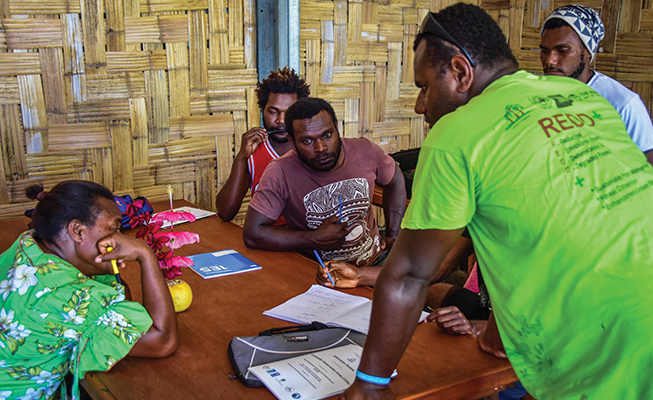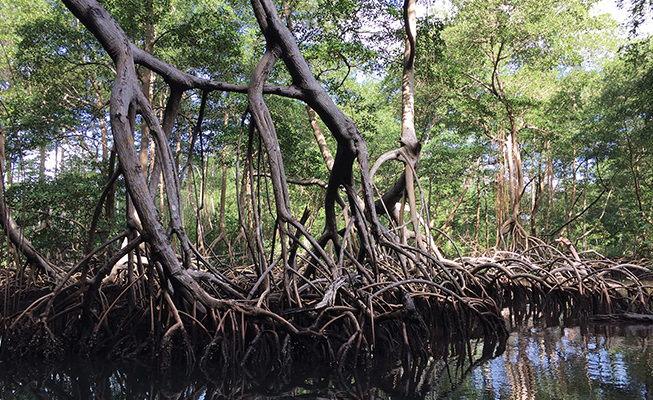DONOR MESSAGE: CONSERVATION INTERNATIONAL
“CEPF grantees are rising to the need for their skills, knowledge and commitment to help communities and governments protect and leverage nature.”
Climate: The solution is in our nature
The need for urgent action on climate change has never been clearer. The October 2018 special report from the Intergovernmental Panel on Climate Change clearly outlined the importance of limiting temperature rise to below 1.5 degrees Celsius, and what is at stake if we fail.
The report documented the deadly climate impacts already in motion, including wildfires, hurricanes and ecosystem loss—consequences that will only worsen without concerted action.
To truly address the problem at scale, the report shows that rapid decarbonization, carbon removal and deployment of natural climate solutions will all be necessary.
In fact, at least 30 percent of cost-effective climate change mitigation potential can be delivered through natural climate solutions. Reducing carbon dioxide emissions makes up about half of this figure, achieved primarily by decreasing or eliminating loss of natural, carbon-rich ecosystems. Restoration of natural ecosystems and other natural CO2 removal actions make up the other half.

The role of civil society and biodiversity
Not only does nature offer immediate opportunities to direct its power to addressing climate change, but it also does so with multiple other benefits. For instance, protecting nature secures the rich biodiversity of natural ecosystems, which promotes ecosystem resilience to climate transitions; bolsters the productivity of our fisheries; and helps ensure that our grasslands and forests continue to supply fresh water, feed people and buffer communities from extreme weather. Employing sustainable practices at the landscape level can boost both climate mitigation and adaptation while also supporting broader development strategies and national plans.
Given the vast, yet unrealized potential of nature as a climate solution, CI is working to rapidly scale the protection and restoration of natural ecosystems as an essential part of meeting the climate challenge. And it follows that we enthusiastically support the efforts being made by CEPF’s grantees and other civil society groups working to protect the world’s biodiversity hotspots, thereby contributing to the climate solution in several ways:
- By supporting the recovery of globally threatened species, they are securing the resilience of natural systems.
- By conserving intact, carbon-rich natural ecosystems such as mangroves, peatlands, forests and coastal areas, they are preventing the release of large amounts of CO2 into the atmosphere.
- Through the protection and restoration of Key Biodiversity Areas, they are taking steps to ensure the future of ecosystems that are key to addressing climate change.
- By engaging communities in improved land, fresh water and coastal zone management, and sustainable economic activities, they are empowering local people to make certain they have the resources they need to thrive as they experience the stresses of a changing climate.
- In strengthening the capacities of their organizations, CEPF grantees are rising to the need for their skills, knowledge and commitment to help communities and governments protect and leverage nature.

These are precisely the kinds of efforts that we should support and scale up to make the most effective use of nature’s potential for addressing climate change.
Conservation International is proud to be a founding donor of CEPF. We have long known that civil society organizations working at the grassroots level to protect their ecosystems are supporting a global need for biodiversity, but never has their work been more important to all of us than right now. Tapping their skills and knowledge to help governments achieve their goals while also helping local communities thrive is the most practical choice the global community can make as we respond to our changing climate. And it is clear that the time to act is now.
– Jennifer Morris,
Conservation International President
Photo Credits
Jennifer Morris © Conservation International
Climate change and conservation workshop in Santo Province, Vanuatu, part of a grant to Edenhope Foundation. © GIZ – Coen Bosboom
Mangroves in Los Haitises National Park, Dominican Republic. © O. Langrand


